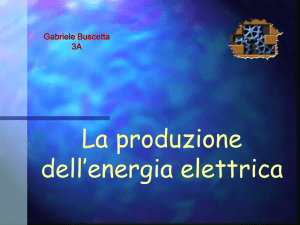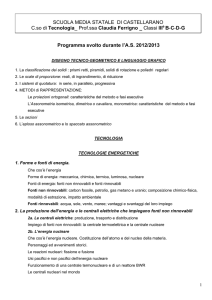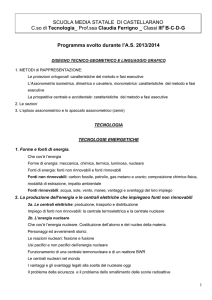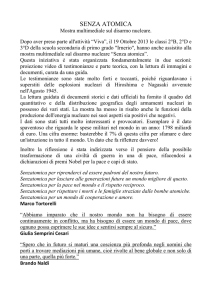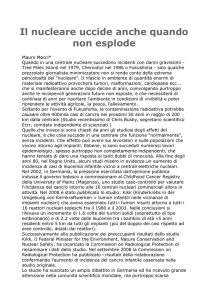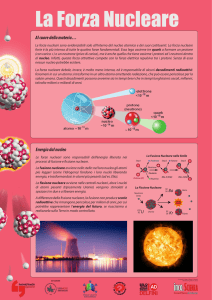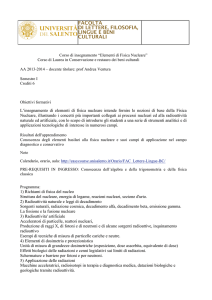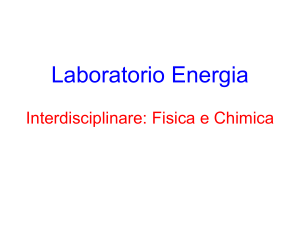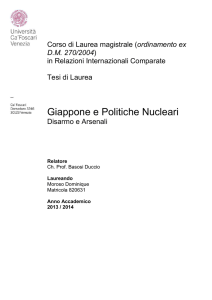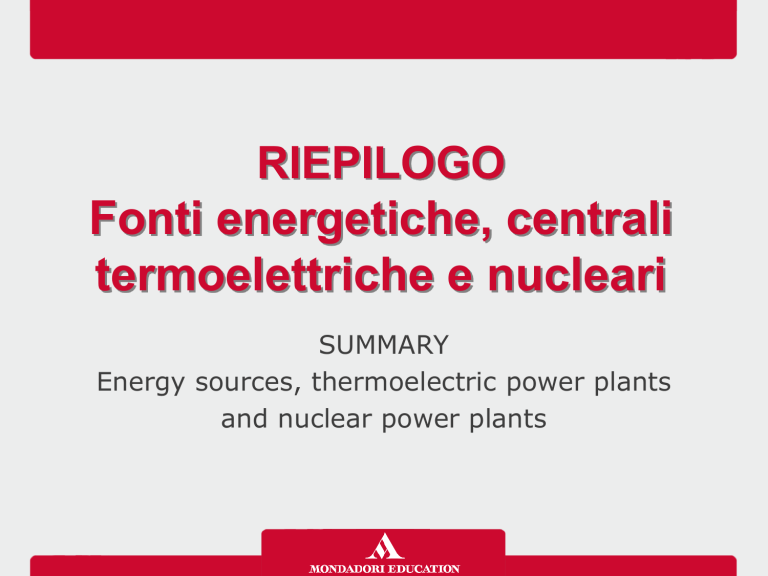
RIEPILOGO
Fonti energetiche, centrali
termoelettriche e nucleari
SUMMARY
Energy sources, thermoelectric power plants
and nuclear power plants
Energia elettrica
» L’energia elettrica è facilmente convertibile in
movimento (mediante il motore elettrico), in luce, in
calore. Queste conversioni sono attuabili con una buona
efficienza, purché il sistema di trasformazione sia
anch’esso efficiente.
» The electrical energy is easily converted into
movement (using an electric motor), in light, in heat.
These conversions are feasible with good efficiency,
provided that the transformation system is also efficient.
Fonti di energia non rinnovabili
» Le fonti di energia non rinnovabili sono destinate
in periodi più o meno lunghi a esaurirsi. I combustibili
fossili (petrolio, carbone, gas naturale) ma anche il
“combustibile” per l’energia nucleare, appartengono a
questa categoria.
» The non-renewable energy sources are destined in
more or less long periods to run out. The fossil fuels
(oil, coal, natural gas) but also the “fuel” for nuclear
energy, belong to this category.
Fonti di energia rinnovabili
»
Le fonti di energia rinnovabili sono tutte quelle che non si esauriscono mai,
oppure si esauriscono in tempi lunghissimi (per esempio l’energia del sole ci
sarà per altri milioni di anni) o, ancora, che possono essere ripristinate in
tempi comparabili con le attività umane (ad esempio, per ogni albero bruciato
utilizzato per la produzione di energia elettrica in una centrale a biomasse, un
altro può essere piantato e crescere in pochi anni).
»
The renewable energy sources are those which never finish, or that finish
after a very long time (for example, the energy of the sun will be there for
millions of years) or, again that they can be restored in times comparable with
human activities (for example, for every burnt tree used for the production of
electricity in a biomass power plant, another can be planted, and grow in a
few years).
Fonti di energia rinnovabili
» Le fonti di energie rinnovabili rispettano l’ambiente
e, a differenza di quelle non rinnovabili, non danno
luogo a emissioni di gas che alimentano l’effetto serra
e non emettono sostanze nocive per la salute.
» The renewable energy sources respect the
environment and, unlike non-renewable ones, do not
give rise to emissions gas that generate greenhouse
effect, and emit no harmful substances for the health.
Shale gas
» Lo shale gas è un tipo di gas estratto attraverso la
frantumazione di rocce profonde; esso è considerato da molti
Paesi come la fonte energetica più promettente nel prossimo
futuro. È estratto dalle rocce con il metodo del fracking, la
tecnologia capace di estrarre gas e petrolio dall’interno delle
rocce nelle viscere della Terra.
» The shale gas is a type of gas extracted through the crushing of
the deep rocks; it is considered by many Countries as the most
promising source of energy in the near future. It is extracted
from rocks with the method of fracking, the technology to
extract gas and oil from the rocks in the bowels of the Earth.
Energia nucleare
» Nei processi nucleari attualmente utilizzati solo una
piccolissima parte della materia prodotta si trasforma in
energia. Gli attuali processi di produzione dell’energia
nucleare si basano sulla fissione e sulla fusione
nucleare.
» In nuclear processes currently used, only a small part of
the material produced is transformed into energy. The
current processes of producing nuclear energy are based
on the fission and nuclear fusion.
Energia nucleare
» La fusione nucleare non produce scorie
radioattive e quindi è da considerarsi fonte di
energia più pulita rispetto alla fissione nucleare.
» The nuclear fusion produces no radioactive slags
and therefore is considered to be a source of
cleaner energy than the nuclear fission.
Energia idroelettrica
» L’energia idroelettrica usa l’energia potenziale
dell’acqua, che cadendo su una turbina produce
elettricità tramite un alternatore ad essa
collegato.
» The hydroelectricity uses the potential energy
of water that falling on a turbine producing
electricity through an alternator connected to it.
Energia solare
» Per energia solare s’intende l’energia raggiante
sprigionata dal Sole, per effetto delle reazioni
termonucleari che avvengono nel suo interno, e
trasmessa alla Terra sotto forma di radiazione
elettromagnetica.
» For solar energy means the radiant energy given off by
the Sun, as a result of thermonuclear reactions that take
place within it, and transmitted to Earth in the form of
electromagnetic radiation.
Energia solare
» L’energia solare può essere sfruttata in due modi
fondamentali: per la produzione di acqua calda (solare
termico) e per la produzione di energia elettrica
principalmente mediante sistemi e impianti fotovoltaici
(solare termodinamico).
» The solar energy can be used in two fundamental ways:
for the production of hot water (solar thermal) and for
the production of electricity mainly with systems and
photovoltaic installations (solar thermodynamic).
Energia eolica
» L’energia eolica è il prodotto della conversione
dell’energia cinetica del vento in elettrica. È stata la
prima fonte energetica rinnovabile usata dall’uomo. Il
suo sfruttamento è realizzato tramite generatori eolici.
» The wind energy is the product of the conversion of
the kinetic energy of the wind into electricity energy.
It was the first renewable source of energy used by
humans. Its exploitation is realized by wind
generators.
Energia geotermica
» L’energia geotermica è costituita dal calore contenuto
all’interno della Terra. Essa trae origine dal residuo calore
primitivo del pianeta e soprattutto dalle reazioni nucleari
legate al decadimento radioattivo di alcuni materiali terrestri
(uranio, torio, potassio ecc.).
» The geothermal energy is formed by the heat contained
within the Earth. It originates from the primitive residual heat
of the planet and especially by the nuclear reactions linked to
the radioactive decay of some terrestrial materials (uranium,
thorium, potassium etc.).
Biomasse
» Le biomasse utilizzabili ai fini energetici consistono in tutti
quei materiali organici che possono essere utilizzati
direttamente come combustibili o trasformati in altre sostanze
(solide, liquide o gassose) di più facile e conveniente utilizzo
nei sistemi di conversione.
» The biomasses used for energy purposes consist in all those
organic materials that can be used directly as fuels or
converted into other substances (solid, liquid or gaseous) of
more easy and convenient utilization in the conversion
systems.
Energia marina o oceanica
» Per energia marina o oceanica s’intende
l’energia racchiusa in varie forme nei mari e
negli oceani.
» For marine or oceanic energy means the
energy enclosed in various forms in the seas
and oceans.
Centrali elettriche
» La produzione o generazione o di energia elettrica, che rappresenta la
prima fase nel processo che conduce dalla produzione fino
all'utilizzatore finale, è effettuata dalle centrali elettriche che si
possono raggruppare, per quel che riguarda la loro alimentazione, in
due gruppi: quelle alimentate con fonti energetiche non rinnovabili e
quelle alimentate con fonti energetiche rinnovabili.
» The production or generation or electric energy, which is the first step
in the process leading from production to the end user, is performed
by power plants that can be grouped, as regards their supply, in
two groups: those powered with non-renewable energy and those
powered with renewable energy sources.
Centrali termoelettriche
» Le centrali termoelettriche sono sostanzialmente
costituite da sistemi di conversione che utilizzano
l’energia chimica dei combustibili per trasformarla in
energia elettrica.
» The thermoelectric power plants are
substantially constituted by conversion systems that
use the chemical energy of fuels to transform it into
electric energy.
Centrali nucleari
»
Il controllo della reazione in una centrale nucleare a fissione avviene mediante
l’inserzione di barre, in genere di grafite, che permettono di diminuire la
potenza o addirittura spegnere il reattore mediante l’assorbimento dei
neutroni “liberati” durante il processo. Le centrali nucleari sono quindi
sostanzialmente delle centrali termoelettriche che utilizzano uno o più reattori
nucleari a fissione, reattori che si dividono in generazioni.
»
The control of the reaction in a nuclear fission occurs through the insertion of
bars, typically of graphite, which allow to decrease the power or even shutting
down the reactor by means of the absorption of neutrons "released" during
the process. The nuclear power plants are therefore, essentially, thermal
power plants that use one or more nuclear reactors, reactors that are divided
into generations.
Centrali a fusione nucleare
» Non esistono ancora delle centrali a fusione nucleare,
ma solo prototipi sperimentali attraverso i quali si è
dimostrato che è possibile ottenere energia mediante
fusione di nuclei di elementi leggeri.
» There not exist still nuclear fusion power plants, but
only experimental prototypes through which it is
demonstrated that it is possible to obtain energy by the
fusion of the nuclei of light elements.

